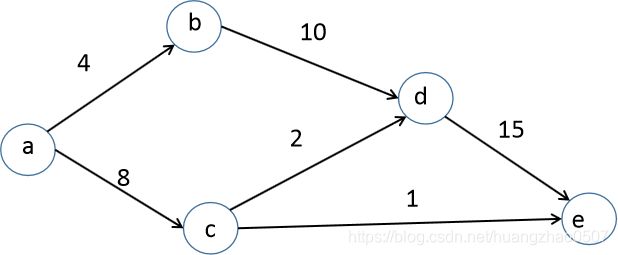【算法】机器人走迷宫(适用于走迷宫、最短路径算法)-20200412
标题:机器人走迷宫(适用于走迷宫、最短路径算法)
问题描述:
- 一块矩形方格,含有障碍和可通行格子,求从某一点到另外一点的最短距离?N*M的矩阵;
其中,1代表障碍,0代表可通行;示例:给定二维矩阵
0 0 1 0
0 1 0 0
0 0 0 0
0 0 0 0
出发点坐标[0, 0],终点坐标[2, 3];
java编写int solve(int[][] grids, int[] start, int[] end)返回最短距离;
思路:
(1)机器人在矩阵范围内可以向上下左右走;
(2)终点[2, 3]可以由[2,1]或[1, 3]走来;可在起点到点[2,1]的距离、起点到[1, 3]的距离中取最小值,再加1(格子之间距离为1)即可;
(3)对于算法初学者,自然想到递归;
当然,递归肯定可以解决问题,但是必须要不能找下去再递归回来,太慢了;时间复杂度O(N^2);
(4)另外一种方式呢?从起点给你1步,你能走到起点的上下左右(当上下左右在格子中);扩散1步后,再扩散1步。。。是否可以扩散到终点,这个距离就是最短距离;就像气味扩散一样,
半径是最短距离。能扩散到终点即可,不必求出终点四周的点,再取min值;----算法效率最高;时间复杂度O(N);
2.若要打印最短路径呢?在历史信息中拉出来,已在代码中注释;
3.若机器人有一次清理障碍的机会呢?代码如何写?–下回分解
4.附带经典带权图最短路径的BFS代码;与方格不同的是,带权需要考虑比较权值大小;
Solution.java:
package robot;
import java.util.*;
public class Solution {
int[][] direct = {{-1, 0}, {1, 0}, {0, -1}, {0, 1}};
// 方格的dfs
public int dfs(int[][] grids, int[] start, int[] end, Set> passedPaths) {
// 每次递归要new flagPaths, 不然会重用导致程序不正确,切很难定位;兵家大忌;
Set> tmpSet = new HashSet<>(passedPaths);
tmpSet.add(Arrays.asList(start[0], start[1]));
if ((Math.abs(start[0] - end[0]) == 0 && Math.abs(start[1] - end[1]) == 1)
|| (Math.abs(start[0] - end[0]) == 1 && Math.abs(start[1] - end[1]) == 0)) {
return 1;
}
int minLen = 1000;
for (int[] item : direct) {
int nextX = start[0] + item[0];
int nextY = start[1] + item[1];
if (nextX >= 0
&& nextX <= grids.length - 1
&& nextY >= 0
&& nextY <= grids[0].length - 1
&& grids[nextX][nextY] != 1
&& !tmpSet.contains(Arrays.asList(nextX, nextY))
) {
// 满足要求才能递归:1、坐标在格子中;2、格子不是障碍;3、不能来回走,从某个点走出来的,不能遍历四个方向造成走回去;
int len = dfs(grids, new int[]{nextX, nextY}, end, tmpSet);
System.out.printf("start to end:%d, %d; %d, %d. -- %d.\n", nextX, nextY, end[0], end[1], len);
minLen = Math.min(len, minLen);
}
}
return minLen + 1;
}
// 方格的bfs;
public int bfs(int[][] grids, int[] start, int[] end) {
// 写是否已经访问的状态;
int[][] state = new int[grids.length][grids[0].length];
Queue queue = new LinkedList();
// 注意:若要打印最短路径,必须将历史信息塞入队列;
queue.offer(start);
state[start[0]][start[1]] = 1;
int count = 0;
while (!queue.isEmpty()) {
count++;
int size = queue.size();
for (int inx = 0; inx < size; inx++) {
int[] node = (int[]) queue.poll();
// 当扩散到终点就拉出来;注意:若要打印最短路径,到达终点时可以拉出来;
if (node[0] == end[0] && node[1] == end[1]) {
// 起点塞进来已经加1,故要减去;
return count - 1;
}
for (int[] item : direct) {
int nextX = node[0] + item[0];
int nextY = node[1] + item[1];
if (nextX >= 0 && nextX <= grids.length - 1
&& nextY >= 0 && nextY <= grids[0].length - 1
&& grids[nextX][nextY] != 1 && state[nextX][nextY] != 1) {
queue.offer(new int[]{nextX, nextY});
state[nextX][nextY] = 1;
}
}
}
}
return -1;
}
public int getMinLen(Map> relMap, Map, Integer> valueMap) {
Map pathMap = new HashMap<>();
pathMap.put("a", 0);
Queue queue = new LinkedList();
queue.offer("a");
while (!queue.isEmpty()) {
String curNode = (String) queue.poll();
if (curNode.equals("e")){
break;
}
for (String subNode : relMap.get(curNode)) {
List key = Arrays.asList(curNode, subNode);
if (null == pathMap.get(subNode)) {
pathMap.put(subNode, pathMap.get(curNode) + valueMap.get(key));
} else {
Integer len = pathMap.get(subNode);
pathMap.put(subNode, Math.min(len, pathMap.get(curNode) + valueMap.get(key)));
}
queue.offer(subNode);
}
}
return pathMap.get("e");
}
}
Main.java
import robot.Solution;
import java.util.*;
public class Main {
public static void main(String[] args){
int[][] grids = {
{0, 0, 1, 0},
{0, 1, 0, 0},
{0, 0, 0, 0},
{0, 0, 0, 0}
};
int[] start = {0, 0};
int[] end = {2, 3};
Set flag = new HashSet<>();
System.out.println(new Solution().dfs(grids, start, end, flag));
System.out.println(new Solution().bfs(grids, start, end));
/**
* 图:
* a -> b 权值:4
* a -> c 权值:8
* b -> d 权值:10
* c -> d 权值:2
* c -> e 权值:1
* d -> e 权值:15
*/
// 也可以自己用邻接矩阵;
Map> relMap = new HashMap<>();
relMap.put("a", Arrays.asList("b", "c"));
relMap.put("b", Arrays.asList("d"));
relMap.put("c", Arrays.asList("d", "e"));
relMap.put("d", Arrays.asList("e"));
Map, Integer> valueMap = new HashMap<>();
valueMap.put(Arrays.asList("a", "b"), 4);
valueMap.put(Arrays.asList("a", "c"), 8);
valueMap.put(Arrays.asList("b", "d"), 10);
valueMap.put(Arrays.asList("c", "d"), 2);
valueMap.put(Arrays.asList("c", "e"), 1);
valueMap.put(Arrays.asList("d", "e"), 15);
System.out.println(new Solution().getMinLen(relMap, valueMap));
}
}
结果:
5
5
9
